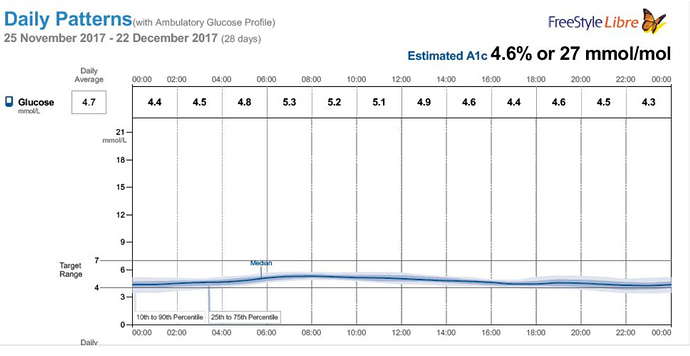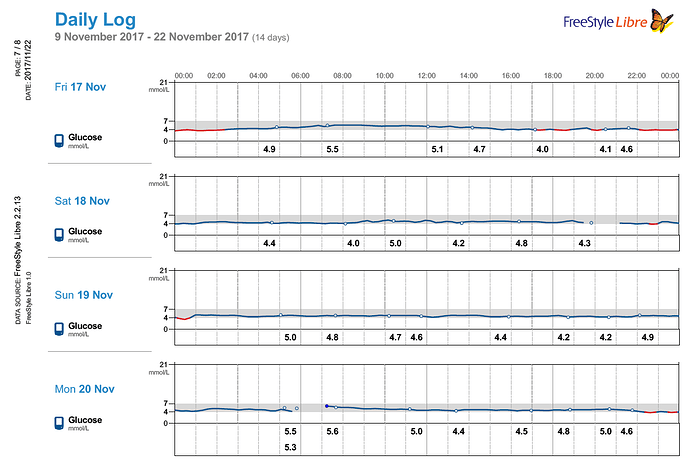I have been on keto for 2 years and have lost 178 pounds
I was using almost 4 bottles of insulin a month . Last August the 18 was my last shot of insulin. A1c stays between 6.6 and 7.6. Two metformin 1000 per day . Bedtime sugar 120 135 morning 160 260
Can I train my system to bypass morning syndrome . I research a lot but can’t find much. Thanks
Morning syndrome
First, CONGRATS on that weight loss! That is absolutely amazing! Keto really seems to be working for you. You lost so much weight and have stopped insulin. It may have taken a while, but that is such an accomplishment.
The ability to get to a normal A1C without medication really depends on the state of your body. For some, it can happen quickly. For others, it can take a long time. You were on quite a high dose of insulin I guess. What are you eating btw? If you were diabetic for a long time, on insulin for a long time, and had uncontrolled blood glucose a long time, it can take a while to reverse all of that damage.
Wow. Congratulations.
A few things to try. One is apple cider vinegar and water before bed. Say, 1-2 tablespoon(s) + water. This might lower your morning blood sugar. A small improvement is possible:
Have you tried longer fasts? 36+ hours? (No data on this though, as to morning blood sugar levels.)
I usually eat 8 16 kinda dirty keto but low carbs . Nothing before bed take a metformin about 10 11 PM. Use a freestyle sensor and track with phone and reader. Has been higher lately. Wonder if I should go back to strict keto,was a little bit better then. My metabolic test are low normal and a1c stays about 7.7 better than the 10-12 before keto. I have been type 2 for 27 27 years
I guess the body is reacting to my new life without insulin. Used to take acv with mother that I make myself
I am big in fermenting lately
Pear vinegar is fantastic btw. I may start back in the mornings
I forgot yes I have done long fast and it seems worse
I do 24 hour fast almost every week
Not as bad but still high. Sorry to be so long but the damage comes from the high low swings. My late wife had high, low swings and ruined her kidneys and was on dialysis.
You are probably still quite insulin resistant. Try cutting your carbohydrate intake to as close to zero as you can manage. Avoid all sugar. Also, while keeping your protein reasonable (not too high, not too low), be sure to eat enough fat. And make sure to eat low-polyunsaturate sources of fat, such as butter, lard, tallow, bacon grease, and the like. Avoid seed oils, because their high percentage of ω-6 fatty acids causes inflammation, which is not helping to reduce your insulin resistance. (Yes, ω-6 fatty acids are essential to the diet, but not in high concentrations. Dr. Phinney says that the challenge with the modern diet is not getting enough ω-6, but to avoid getting too much.)
I only use good fat and I have very low carbs. I think that I have been good on protein. Usually omad
Drink a lot of water and coffee. I was just questioning why it is going higher at some times and not others. Just for my own information. Been ruining my life for a while now I am trying to get in better shape
We are still on lock down here for gyms,I wonder if weight training will help. I walk about 2 2 1/2 miles a day
I have just found out that trying to outlast the dawn effect over the past few years may be counterproductive, at least for me…ex type 2… and I was fasting til early afternoon most days, til my bgl dropped.
Apparently, if you are stressed (I am) with high cortisol then it is not good to fast…body gets the message there is a famine!
So I am now disregarding dawn effect a.m. glucose level and eating a hearty breakfast. Fasting is very easy for me but for me it isn’t healthy apparently. We really are all very different!
You don’t need a gym. I have a great guy on You Tube to share…but I’m blanking on his name now and don’t have him bookmarked at work. Will update when I can.
I think we also have to be careful with being low carb/keto people. We’ll have higher morning blood sugar, particularly those of us (like me) who don’t eat breakfast (which I theorize would cause blood sugar to come down, though I have not tested this). The issue is: Is morning blood sugar too high (or maybe even bad for us)? I assume it’s not:
Also, if you’re getting some days where you get higher blood sugar and others with lower, that’s a tough analysis. Are you doing anything different? Is it really higher (those blood sugar meters have poor accuracy)? What else might it be (including stress, lack of sleep, etc.)?
I’ve been reading a lot about it and what I understood is that highs are always bad. The ideal situation is to avoid jumps up and down. Perhaps that’d involve eating something in the morning to make BG come down, if that works. A little something. I’ve read that A1c isn’t the only predictor for later complications. The highs can cause damage.
Another, very real, question is whether or not it matters.
I hope no one will feel criticised by my saying this, but I am wondering, in fact, whether this discussion isn’t an example of an aphorism I read a few months ago, to the effect that using a measurement as a marker of a condition makes us work towards manipulating the biomarker instead of working towards maximising health.
After all, our ancestors managed to survive and even thrive without knowing what their blood glucose was doing. . . .
I got into an argument on Twitter with someone who said you HAD to have a morning blood sugar of X (I forget what X was, but it was pretty low, as in 80). He cited an epi study where the lowest risk was for those with X morning blood sugar.
My argument against “high morning blood sugars are bad at all times” includes the following.
Look at how ruler-flat those look. They are higher every morning and lower every evening, so it’s not a true flat line, but I challenge anyone to eat paleo or high carb and show me something similar.
Is my higher (glucose-sparing) morning blood sugar bad for me? I tend to doubt it.
And I do think that looking at one marker without context is fairly useless. It’s the whole stupid argument: “I went on low carb and lost a ton of weight, experienced other benefits, and have boundless energy”; yeah, but your LDL went up, so you will DIE.
As you discuss with markers, I’m not one to try to adjust my markers just for the sole reason to adjust them.
Now, if you’re experiencing odd increases in morning blood sugar, that might be a reason to look into that. Maybe you can adjust sleep/reduce stress/etc.?
But I have 1+ years worth of data, where every month looks like that picture: higher in the morning, lower in the evening. And my HbA1C is not bad (4.9-5.1), so I’m not concerned.
Sounds as though you are quoting Peter, lol!
I like that whole post, btw. It sounds like a really sensible way to look at things.
LOL! #NOTDEADYET
Yeah I was just curious about being diabetic and on insulin for so long I might have done damage to my body in other ways. At one time I was on 4 1/2 bottles of insulin a month and 2 1000 metformin a day. I have had a lot of stress lately and I don’t sleep well. Maybe that’s the reason. I started back acv twice a day and I also wondered if the way I eat could be the problem. Most days just coffee and maybe a sammie of ham and cheese on 0 carb bread or Joseph’s pitas or flat bread.
Fasting increased my blood sugar, so, I would not recommend long fasts…
I would suggest using a small amount of insulin to cover the dawn phenomenon, if your primary care will not prescribe morning metformin.
@Big While it’s possible that your metabolism might be permanently damaged, I don’t think you need to worry. Concentrate on eating whole, real foods, such as meat and dairy, and limit your carb intake to the leafy greens and cruciferous vegetables, such as broccoli, cauliflower, and Brussels sprouts, and you will be promoting the best possible metabolic health for yourself.
Personally, I find that commercial “keto-friendly” products don’t work for me. Either they remind me too much of what they’re replacing, or they are more carb-laden than I’d prefer.
People post on these forums about products or recipes that “taste just like real bread,” and usually they are far too eggy-tasting for me to enjoy them. There are a few recipes I do enjoy on their own terms, such as Fathead pizza, a couple of sugar-free cheesecakes, and Maria Emmerich’s recipe for Brussels sprouts (sautéed in bacon grease, then broiled with bacon pieces and cheese, yum!). But otherwise, I’m just a plain meat-and-cauliflower kind of guy.
Maybe it’s the daily way I eat. Most days I don’t eat till about 2 or 3 and little at that. I am just not hungry so I don’t eat. Maybe I will go back to eating a larger breakfast and then nothing else in the day. I hate to eat if I am not hungry. This is what caused me to be so obese in my life. Just eating for the sake of eating. I have to kinda have to fix something later in the day for my mom. I bought her to live with me after my wife passed away and she has early stage dementia and won’t eat right so I fix something for the 2 of us. Maybe go back and see what happens. Thanks for all your advice and support, ya’ll guys have been my rock. I don’t think I would have been so successful if not for this site.
By the way I am born and raised in the southern part of the United States and we just have to have a good tomato sandwich with Dukes mayo on what we call loaf bread. I use the Aldi zero carb bread. Do make my own but not the same.
You don’t need to go the the gym for weight training. Body weight training can be pretty effective.
There is a book called “You are Your Own Gym” that uses all body weight exercises and household items for the workouts.


